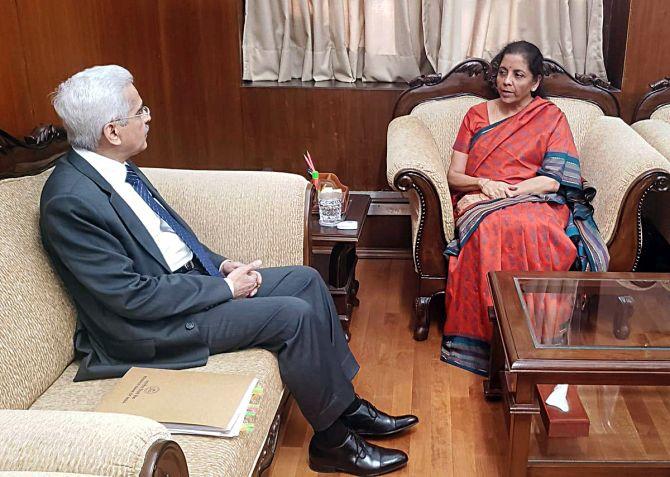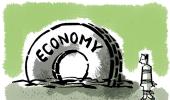'Credit expansion is probably the quickest way to get the economy going again.'
'Easy credit is like a shot of nitro in a race car: In timely, small, quick, doses it can give a tremendous boost but carried to extreme it can destroy the engine,' points out S Muralidharan, former managing director, BNP Paribas.

In an emergency meeting of the monetary policy committee on Friday, May 22, the RBI cut the repo rates by 40 basis points to 4%. The reverse repo rate was also cut to 3.35%.
What does it mean to the Covid-ravaged economy?
Firstly, let us look at what is this measure and what does it mean stripped of the financial jargon?
What does it mean to you and me, the people on the street: Should we care mildly, should we panic or should we be indifferent?
The jargons first: Repo is short for repurchase.
When faced with liquidity shortage in the markets, governments can flood them with cash by giving Tom Dick and Harry money, except they don't give money literally to Tom Dick or Harry but to banks with the expectation that the latter would give it to the aforesaid gents.
A repo is essentially this, but with a twist: The banks don't get cash for free; they have to 'sell' some of the bonds they hold to the central bank in order to get the cash.
There is an implicit agreement that the banks will buy back those very bonds at a later date.
By giving cash without any conditions attached, the central banks would be taking the credit risk of lending.
In a repo the lending risk is averted as the RBI holds the bonds which belonged to the bank that borrowed the cash.
So what is the big deal, you might ask.
Why take my asset and lend me cash?
What is in it for me?
The point is that the bonds in your hands were not really working hard enough. The RBI is telling you to stop doing lazy banking and lend money to the business sector.
More importantly, it is a signalling mechanism.
The RBI is shouting from the rooftops that banks need to lower their lending rates and lend more.
What is to stop the banks which are flushed with deposits from depositing them with RBI, making 3 to 4% safe returns and still go to golf at 3 pm?
The RBI has thought of that too -- it is called the reverse repo.
Just as the RBI can infuse a shot of cash into the market, it can also soak up excess liquidity from the market by selling government bonds to those banks and taking their excess cash.
What this does is to encourage banks to lend to businesses and make more money than they would make from investing in government bonds. This is done in order to stimulate a moribund economy such as the one now.
Why should the businesses heed the signal?
The government having made the intent clear, the market can expect further steps to make investing in/ramping up capacities, (re)opening businesses, employing/re-employing labour it had let go etc easier.
In other words the government makes a statement of intent by saying, 'Here, take this cheaper money and restart your business; you can expect some non-monetary steps too to help you do business'.
The signal is also telling banks to lend more as credit expansion is probably the quickest way to get the economy going again.
Easy credit is like a shot of nitro in a race car: In timely, small, quick, doses it can give a tremendous boost but carried to extreme it can destroy the engine.
Nitro and credit are similar in their ability to make a big difference in a short amount of time.
The difference is you can compute the quantity of nitro required to the last micro gram, time its infusion to the micro second and measure its impact to the fraction of a horsepower;
Credit, alas, cannot be so precisely administered nor its result easily quantified.
What exactly has the RBI signalled, then? It did three things.
1. The MPC meeting was sudden and unscheduled. The next scheduled meeting of the MPC was barely 10 days away.
The fact that the RBI called this unscheduled meeting so close to a scheduled one clearly communicates a sense of urgency (the uncharitable would say alarm or even panic) they feel over the economy and their willingness to do what it takes.
2. The RBI wants the economy to get going at its normal rate as early as possible. It has expressed its determination to help by reducing borrowing rates and by expanding liquidity.
3. Part of the announcement was also the extension of moratorium' on loans by three more months. Businesses need not worry about their maturing loan obligations for some more time so as to get back on their feet.
This repo rate of 4% (and reverse repo of 3.35%) is the lowest level in the last 20 years.
Although in 2009 the reverse repo rates had fallen as low as today's, the repo rates were higher.
The conclusion is that the monetary authorities did not deem the situation as dire as it is today. The 2009 rate cut came on the heels of the global financial crisis unleashed in the USA by the sub-prime lending crisis.
That was a financial misdeed of a few which went on to affect the entire world. It is different from today in the sense that despite its origins in China, today's problem is universal -- everyone is affected.
We knew exactly what caused the financial crisis of 2008. We do not know beyond some wild allegations what caused this 2019/20 pandemic or how to deal with it.
What does the market players think about today's cut? Abheek Barua of HDFC Bank has a telling comment: 'But the powder needs to be kept dry should the battle turn bloodier. (We are) certainly expecting more cuts of at least 50 bps going forward'.
The battle will turn bloodier as the days go by, especially if the confidence is slower to return.
The problem will be compounded by two factors: The going home of the guest workers from every state and their reluctance to return when economic activity re-starts. Their numbers are large and the sectors they kept humming were key.
Almost everyone is talking about 'confidence' (or lack thereof) and RBI measures amount to confidence builders.
There is also a perception that this is just the beginning of a bloody and ugly battle and possibly a long one.
Why is this necessary? Unless one has been hiding under a rock for a few months, what has caused all this would be very evident.
Although Covid precipitated it in the most brutal fashion in living memory, the problems have been piling up for a while.
A cavalcade of business frauds and failures starting with the flamboyant Vijay Mallya, DHFL, Yes Bank etc have been following one another with unfailing regularity and certainty exceeded only by the sun rising the next day.
Any attempt to rein them in have been met with veiled threats that the businesses -- businessmen at any rate -- would get up and walk away if laws were enforced in what they deemed to be 'draconian' fashion.
Sadly, I have heard some highly respectable journalists of long standing too parrot this line: 'My way or the highway'.
Howsoever important, and very important, it is too for us to draw a Lakshman Rekha on how far we are willing to let Capital decide the arc of our lives, it is for another day.
Suffice to say that we had much-deferred economic problems building up, financial sores and business cankers erupting for some time.
When we made attempts to address them, bankers stopped lending citing'CBI investigations', businessmen would not do business crying 'raid raj' and political opportunists simply raved, ranted and screamed.
We could have carried on and sorted them out slowly and replaced a broken model with a fairer one in which risk-takers risked their own millions to become billionaires, benefiting millions with jobs and products on the way, instead of misusing public billions for private benefit and throwing millions out of jobs.
But then Covid came along. It is what (then US president George W Bush's defence secretary) Donald Rumsfeld famously called 'the unknown unknown'.
Covid completely blindsided humanity with its virulence, the rapidity of its spread, lack of a viable antidote and without known means of slowing down its spread.
We humans are still discovering how exactly it affects us. Fortunately we had one weapon left and it was social distancing. Unfortunately this was a cure worse than the disease.
So what is the damage that we are trying to repair?
Across the globe, economic growth will be in negative territory. This will certainly affect our software exports by fanning the flames of xenophobic immigration policies in key markets like the USA.
Our own economic activity has plumbed the depths and 2020-2021 is expected to see 1 to 6% reduction in GDP depending on whom you believe.
Work From Home and other new-fangled ways of doing business will grow if only in imitation of Western trends. But these are the new realities.
What we can be sure of is that yesterday's certainties are gone for good. We are stepping into unknown territory in business and economics.
How well are we placed to handle these changes? It is too early to tell. Without being alarmists we can safely assume that our lack of discipline (as in wearing masks for the benefit of all), inability to understand the real shape and size of this monster disease (non-scientific temperament), and faith in unproven quackery could combine to create a huge spike after the economy is opened up.
The broken and polarised polity will render any meaningful, coherent and effective public action difficult.
In this situation, the only weapon left in the hands of the government is monetary. And that is what they have done.
Can they do more? Possibly yes.
If they used their big weapon too early and if it should fail, we may never recover from the crisis of confidence that would result.
That is where I think the finance minister is coming from -- waiting to see how the limited opening up fares before throwing more at the problem.
What can we as individuals do?
Wear masks, protect others even as we protect ourselves and realise that this not the end, nor even the beginning of the end, but only the end of the beginning.
Introducing 'talking' pictures in 1927, Al Jolson famously said, 'You ain't seen nothin' yet'.
Talking pictures, for all their faults, are nowhere near as malevolent as COVID-19, and therein lies the rub.
S Muralidharan retired as the managing director of BNP Paribas after serving the bank for 20 years.











 © 2025
© 2025